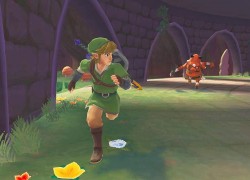
As Nintendo prepares to launch its new console, the Wii U, sometime in the near future, fans of the company are already experiencing a sharp decline in the quality of games released for the soon-to-be outdated Wii. Fortunately, gamers can still enjoy at least one more high-profile Wii release: The Legend of Zelda: Skyward Sword. The game’s release marks the 25th anniversary of the beloved Zelda franchise while simultaneously pushing it into the future by introducing modern gaming conventions that improve on the series’ classic formula.
Despite several new additions to the series, Skyward Sword is still, at its heart, a Zelda game. Gamers will once again take on the role of Link as they attempt to rescue Zelda and save the world. The game’s developers have stated that the game takes place before any other game in the Zelda timeline, though the developers have previously stated that the games do not form one narrative or universe. Regardless, Skyward Sword‘s story is one of the best in the series. Nintendo has once again crafted a narrative on an epic scale but has done a much better job developing key characters and weaving emotion into their stories this time.
Nintendo has done an even better job revolutionizing Zelda’s gameplay. Combat is now controlled entirely by motion with Link’s sword mirroring the Wii’s remote 1:1. The addition adds considerable quality to the gameplay. Not only do the controls more fully immerse the player in the action, but they also bring a whole new element of strategy to the combat segments. Gamers have to aim their strikes in the correct locations and swing in the right direction to take advantage of enemy vulnerabilities. The combat is engaging and feels very intuitive. It would be great to see more Wii games take advantage of this type of gameplay, and it’s truly unfortunate that gamers have had to wait until the end of the Wii’s life cycle to see a game that truly capitalizes on the premise of the console.
Besides combat, players will explore dungeons, uncover new gadgets and weapons and take on epic bosses, all of which is standard in any Zelda adventure. This time, there are fewer dungeons and Link returns to areas far more frequently than in previous games, but Nintendo has cleverly built the overworld into a dungeon of its own. Link needs to engage enemies, utilize new gadgets and solve puzzles just to reach the dungeons. This expands the gameplay in a unique way and makes up for the smaller number of settings.
Unfortunately, despite several amazing successes, Skyward Sword hasn’t completely overcome all of the dated conventions of its past iterations. The game’s revolutionary controls also mean that the game has a very slow start. The beginning of Skyward Sword is simply tedious as the game over-explains every aspect of the controls and gameplay. While I can understand moving somewhat slower given the changes to the combat mechanisms, other elements simply do not need to be explained and indeed would not be in other, more modern games. This problem crops up throughout the game in bizarre ways; for example, every time Link acquires a new item since the last time the game was shut down, the game explains in detail what the item is, even if it has been collected before. This includes every one of the various denominations of Rupees, the game’s currency, which becomes incredibly annoying. Skyward Sword insists on holding the gamer’s hand well beyond what is necessary or standard in modern games.
Skyward Sword also feels slightly outdated when it comes to Nintendo’s decision to once again forgo employing voice actors to help deliver the story, instead using text that appears on the screen. Given how much Skyward Sword has attempted to bring a more modern feel to the game, the move is a disappointing decision. At this point, voice acting is incredibly common in the industry, and it’s hard not to feel that it would have helped bring an extra level of emotion to an already amazing tale.
Even with these questionable design decisions, Nintendo has created a truly incredible game in Skyward Sword and has set the course for the game’s future by modernizing its storytelling and gameplay for the better. I found myself finally understanding how motion controls can steer gameplay and improve on it instead of just serving as a neat gimmick in a game that otherwise would function with a normal controller. I can’t wait to see what moves the series makes going forward, but I’m thoroughly convinced that 1:1 motion control is a basis Nintendo should build upon. While it would be nice to see Nintendo modernize the series in other ways, the game is still a huge step forward and one of the best games on the Wii and in the series. I give Skyward Sword a 9.5/10.
